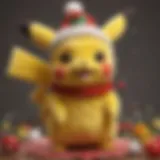Top Strategies for Selling Your Pokémon Cards Effectively


Intro
Selling Pokémon cards can be a bit of a puzzle for many fans and collectors. With a vast array of places to consider, it’s vital to find the right channels to trade those shiny collectibles for cash or other cards you might be after. From the comfort of your home to community centers bustling with card enthusiasts, the options are numerous and sometimes overwhelming.
This guide will navigate through effective avenues for selling Pokémon cards, both online and offline, giving insights into the best marketplaces and specialized stores. Additionally, we'll look into community-driven platforms where you can connect with fellow fans. By the end, you should feel more confident in your approach and have strategies in hand to maximize your selling potential.
Let’s jump straight into the nitty-gritty, shall we?
Understanding the Pokémon Card Market
When diving into the world of Pokémon card selling, grasping the dynamics of the market is nothing short of essential. You could have a treasure trove of Charizards and Rare Hollows, yet if you’re oblivious to market trends and what determines prices, your cards might miss their true selling potential. The Pokémon card market isn’t static; it ebbs and flows much like the tide, influenced by various factors from player demand to nostalgia among collectors.
Market Trends and Price Fluctuations
To effectively sell Pokémon cards, it’s critical to stay in tune with current market trends. The prices of cards can change dramatically overnight due to various events. For instance, when a new set is released, it can create a buzz that drives demand for certain cards, causing their values to spike. Conversely, a card that was all the rage yesterday might lose traction tomorrow if a new meta emerges in gameplay.
If you get a sense of the timing for your sales, you can make a mint! Pay attention to popular online platforms where these transactions take place. Websites like eBay and Tcgplayer often reveal trends in what cards are selling and at what prices. The prices shown can be like a blinking lighthouse guiding you through fog—if you know what you’re looking at, you can navigate to your goals.
"In the world of collectibles, knowledge is power, and timing is everything."
Some important considerations to bear in mind include:
- Economic Factors: Broader economic issues can play a role. If people are tightening their wallets, expect card prices to reflect less demand.
- Popularity of Pokémon: The resurgence of Pokémon in popular culture can elevate card prices. The show's anniversary, new video games, or movies can stoke excitement.
- Condition and Rarity: The state of a card and its scarcity can massively influence its price. Those mint-condition first editions? They’re like fine wine—they only get better with age.
Value Assessment of Your Cards
Understanding how to evaluate your own cards is crucial before diving into selling. An accurate assessment can determine not only if you should sell but also at what price to list your items. To break this down:
- Research Market Listings: Check various platforms to see how similar cards are priced. Tcgplayer is excellent for this as it provides a comprehensive overview of current market values.
- Grading: If your cards are in pristine condition, consider getting them graded by a professional service like PSA or Beckett. Graded cards can command significantly higher prices.
- Condition Matters: Note the physical state of your cards. Cards with scratches, bends, or any signs of wear will typically sell for far less than ones preserved in protective sleeves.
If you remember the importance of these factors, you’ll have a solid foundation to achieve satisfactory sales results. In a bustling marketplace like Pokémon cards, being well-informed sets you apart from the rest.
Online Marketplaces
When it comes to selling Pokémon cards, online marketplaces are a game changer. The digital landscape offers a broad reach, allowing sellers to connect with potential buyers across the globe. This is especially important when considering the niche nature of Pokémon cards; the more eyes on your collection, the higher the chance of finding someone who's willing to pay the right price.
Key benefits of using online marketplaces include convenience, variety, and often a more straightforward selling process. For most sellers, platforms like eBay, Tcgplayer, Facebook Marketplace, and social media outlets serve as one-stop shops for listing, marketing, and selling cards.
eBay
Creating Effective Listings
Creating effective listings on eBay can make or break your sales. A well-crafted listing doesn't just attract attention; it also informs potential buyers. High-quality images play a pivotal role, as they provide a visual assurance of the card's condition. When posting, it’s crucial to write clear and concise descriptions that include details like the card's condition, rarity, and any special features. This transparency fosters buyer trust and encourages sales.
A unique aspect of eBay is its auction format. This allows sellers to potentially sell cards at higher prices, especially rare ones. However, it requires some patience and monitoring. The main downside is that the auction can also lead to lower selling prices if there are few bidders. But, when done correctly, creating effective listings can be a highly beneficial part of your selling strategy.
Understanding Fees and Shipping
Understanding fees and shipping on eBay is essential in ensuring you get the most out of your sales. eBay charges a variety of fees, including listing fees and final value fees, which can take a bite out of your profits. Knowing these fees from the get-go helps you price your items more effectively.
A valuable feature of eBay is its access to a global audience, which often means higher selling potential. That said, shipping can become cumbersome. Sellers must choose shipping options wisely to balance cost and speed. It’s also essential to pack cards securely to prevent damage during transit, as this can lead to disputes and returns.
Tcgplayer
Pros of Using Tcgplayer
Tcgplayer is often seen as a niche hub for trading card game enthusiasts. One significant benefit of using this platform is its specific targeting of those interested in collectible cards. Unlike broader platforms, Tcgplayer allows card sellers to connect with a focused audience—people who are genuinely looking for Pokémon cards.


The site features robust tools for price tracking and market analysis, making it easier to find the right price for your cards. However, it also has its drawbacks; fees may vary, and sellers should ensure they understand these before listing. Despite this, the attractive marketplace draws more engaged buyers, making it a popular choice.
Setting Competitive Prices
Setting competitive prices on Tcgplayer requires some savvy. The site offers various resources to gauge the going rates for cards, which is invaluable for sellers. Understanding the trends in card pricing ensures you're not overpricing or undervaluing your items. Sellers must remember that competitive pricing helps not only in attracting buyers but also in ensuring a swift sale.
An interesting feature of Tcgplayer is its tendency towards a stable pricing environment, which can contribute to a seller's long-term success. The major disadvantage could be that it may take longer to sell certain cards compared to platforms with wider audiences, like eBay. Still, it is a favored platform for dedicated sellers due to its targeted niche.
Facebook Marketplace
Local Selling Considerations
Facebook Marketplace is increasingly being recognized as a convenient tool for local sales. Engaging with local buyers can foster connections and simplify transactions. The immediate nature of local selling often leads to quicker sales, with the added benefit of no shipping costs involved. Sellers can meet buyers in public areas to conduct transactions, making it a safer option.
However, local selling does have its considerations—timing, negotiation, and meeting security can become tricky. For instance, agreeing on a time and place to meet safely can be cumbersome but is crucial. This requires sellers to stay vigilant to avoid scams, as not every interaction may be trustworthy. Nonetheless, local selling can create a community feel, fostering repeat business.
Safety and Trustworthiness
Safety and trustworthiness in online marketplaces, especially Facebook, is an ongoing concern. While Facebook Marketplace allows for direct communication with buyers, ensuring a smooth and secure transaction is paramount. One advantage is the option to check profiles, which can sometimes provide reassurance when negotiating.
The downside, however, is that social media platforms are not primarily designed for trading; this can introduce risks. It's often a case of buyer beware, and sellers must remain cautious and considerate of potential scams. Still, if managed wisely, Facebook can be a practical tool to connect with fellow trainers.
Instagram and Twitter
Building a Following
Establishing a following on platforms like Instagram and Twitter can be a strategic edge for sellers. These platforms allow for sharing content and showcasing collections, which can draw in interested buyers who appreciate your unique offerings. Building a follower base often leads to organic engagement; fans may share your posts, extending your reach even further.
However, growing a following takes time and effort. It's not enough to post sporadically; consistency and interaction with followers are key. Sellers must actively engage with their audience, keeping them updated on new cards and offerings. While it's a slower build-up, the long-term relationships can aid in creating loyalty among buyers.
Using Hashtags for Visibility
Using hashtags for visibility is another effective practice on social networks like Instagram and Twitter. Hashtags can attract attention to your posts, putting your listings in front of those most interested in Pokémon cards. They help categorize your content, making it easier for potential buyers to find what they're looking for.
An efficient strategy is to research popular hashtags within the Pokémon trading community. Using the right mix can significantly enhance the visibility of your posts. The downside is that not using them properly can lead your posts to be lost in the noise, reducing your reach. But with a smart approach, leveraging hashtags can be a significant boon for sellers seeking to make connections and drive sales.
Specialized Online Stores
Specialized online stores put a spotlight on niche markets, making them ideal for selling Pokémon cards. These platforms cater specifically to collectors, traders, and enthusiasts alike. They often provide features that general marketplaces lack, such as deeper insights into card values, better security for transactions, and platforms designed specifically with trading cards in mind. Sellers can benefit from targeting a community that is already engaged and passionate, leading to quicker sales and sometimes better prices. When it comes to Pokémon cards, using specialized stores can be a game changer.
Card Cavern
Features of Card Cavern
Card Cavern is a player in the specialized Pokémon trading card market, offering a bunch of features tailored to sellers. One solid aspect about Card Cavern lies in its user-friendly interface. This makes listing cards a breeze, whether you're a seasoned seller or a newbie. They showcase a detailed catalog of cards which includes images and descriptions, helping buyers to make informed decisions. An added bonus? Card Cavern often runs promotions for sellers, which can include reduced fees or highlighted listings. This all sounds promising, but one must be aware of the fees that could cut into your profits. Even though they have a solid infrastructure, it's essential to read the fine print regarding costs.
How to Sell Effectively
To sell effectively on Card Cavern, knowing your cards is key. Start by doing research on recent sales to find a competitive price for your collection. One standout feature is the ability to create attractive listings. High-quality images and engaging descriptions elevate your cards from simple listings to eye-catching pieces. A strategy worth considering is regularly updating your listings based on market changes. While it's essential to be proactive, it’s just as important to ensure you don’t overwhelm potential buyers with too many listings at once, which could dilute interest.
ChannelFireball
Understanding Their Buying Process
ChannelFireball stands out because of its straightforward and streamlined buying process. They typically buy cards directly from sellers, providing an easy way to unload your cards for cash or store credit. The key here is transparency. ChannelFireball clearly outlines how they evaluate cards – from condition to rarity – ensuring that sellers feel confident in their prices. However, remain alert; while this process is generally convenient, the prices they offer might be lower than market value, given their need to resell. Still, for those who prefer speed over getting the absolute highest dollar, it’s worth exploring.
Payment and Shipping Procedures
Once a deal is struck with ChannelFireball, their payment and shipping procedures are simple and effective. They offer multiple payment methods, including PayPal, which many find reassuring. The unique feature about their shipping process is the ease of printing shipping labels, allowing sellers to send cards without spending a lot of time on logistics. One disadvantage here could be the delay in receiving payment, as they tend to inspect cards after shipment, which might frustrate some sellers in urgent situations. But overall, it’s a smooth experience if you're willing to wait a bit.


Local Options
When it comes to selling Pokémon cards, local options provide a more personal touch that can enhance both the selling experience and the potential for profit. Many collectors appreciate being able to see the cards in person, fostering trust and allowing for more rapid transactions. This section delves into two prominent local avenues: card shops and flea markets or conventions.
Card Shops
Finding Local Stores
Finding local card shops is often the first step for any Pokémon card seller attempting to navigate the bustling marketplace. These establishments are specifically designed for trading card enthusiasts, making them a trusted destination for buyers and sellers alike. One of the main perks of local stores is the ability to gauge customer interest immediately. There's a certain camaraderie shared among collectors, and the atmosphere tends to inspire sales.
To find a suitable store, start by utilizing online maps or simply asking fellow collectors. Local game stores are often mentioned in community forums or Facebook groups, becoming a great resource for names and reviews. However, every locale is different—some areas may boast an abundance of stores, while others may only have one or two. An additional plus is that many of these shops often organize events, fostering an environment of engagement and socializing around card trading, which can lead to more lucrative opportunities.
Negotiating Prices
The art of negotiating prices in a local card shop is another significant factor. Unlike online platforms that have set prices based on algorithms, card shops encourage haggling, which can work in the seller's favor. A key characteristic of this process is the face-to-face interaction—it provides the opportunity to build rapport with the shop owner or fellow collectors, often translating into favorable deals.
When discussing prices, it's crucial to have a basic understanding of your card's market value. Generally, the shop owner will have better insight into what flies off the shelf. Thus, having that knowledge equips you to negotiate reasonably without underselling yourself. While this approach does come with its risks—potentially ending up with less than expected if negotiations falter—the rewards can be significant if done tactfully.
Flea Markets and Conventions
Setting Up a Booth
Flea markets and conventions are another exciting way to sell Pokémon cards. Setting up a booth at these events allows for maximum visibility and direct interaction with your target audience. The unique feature of this approach is the dynamic setting; unlike static shops, these environments can attract serious buyers who are ready to make a deal.
Moreover, many collectors attending these events are on the lookout for rare cards, giving sellers an advantage. Preparing well in advance—acquiring a suitable table, displaying your cards attractively, and ensuring you have plenty of sleeves to protect them—can enhance your sales. While not all flea markets or conventions may yield the expected foot traffic, finding the right event can lead to promising sales.
Connecting with Other Collectors
Engaging with other collectors at flea markets and conventions can be hugely beneficial. This interaction is not just about selling cards; it also opens up avenues for trading, networking, and exchanging insights. A significant benefit here is the ability to learn directly from seasoned collectors who might share tidbits about where to find hot items or even how to market your collection more effectively.
However, there is a downside; this face-to-face communication requires a different set of social skills and confidence that not everyone possesses. It’s not merely about transactions but about relationships—some collectors might prefer online engagement, where interactions can feel less daunting. Yet, overcoming that hesitation can often lead to enriching encounters and long-lasting connections in the Pokémon community.
Overall, whether you're opting for card shops or immersing yourself in flea markets and conventions, local options add layers of complexity and excitement to the selling process—helping you find the method that resonates with you and your trading style.
Community-Driven Platforms
Community-driven platforms offer a unique space for trading Pokémon cards, because they enable enthusiasts to connect directly. Both buyers and sellers benefit from these platforms as they often foster a sense of belonging among enthusiasts. These communities tend to be rich with shared knowledge, advice, and experiences, enhancing the overall selling experience.
Utilizing these platforms can lead to significant advantages, such as reduced seller fees compared to traditional sites, a direct line of communication, and immediate feedback from fellow fans. However, it’s essential to navigate these spaces carefully, as trust can be an issue when engaging with strangers.
Reddit and Forums
Subreddits for Trading
Subreddits dedicated to trading cards have become an integral part of the Pokémon community. They enable users to post their cards for trade or sale, reaching a large audience of like-minded collectors. One key characteristic is the ability to focus on specific niches, such as rare cards or particular editions, which makes it easier for sellers to find interested buyers.
The main benefit of using subreddits for trading is that they offer an informal setting where users can engage without the pressure often felt on traditional selling platforms. The interactive nature creates opportunities for negotiations and discussions about card values and rarity.
However, moderation and rules are vital here. Each subreddit comes with its set of guidelines, and failure to follow them can result in being banned or losing credibility. So, always read those pinned posts before diving in.
Engaging with the Pokémon community can greatly enhance your selling experience, bringing you closer to fellow collectors.
Building Trust Within the Community
Trust is the cornerstone of successful transactions in any marketplace, and community-driven platforms are no different. Building trust within these groups involves a few steps like engaging in discussions, providing valuable insights, and being transparent about the cards you sell.
A key aspect of trust is the feedback mechanism that many forums and subreddits have in place. Users can leave comments or ratings about their experiences with different sellers. This feature helps potential buyers feel more safe about their transactions, thereby encouraging them to take action when they see a well-reviewed seller.
Nonetheless, new sellers may find it more challenging to gain that trust right off the bat. It may take time and effort to establish credibility, but it’s worth the wait. Don’t rush it – often, patience leads to more fruitful long-term relationships.


Discord Servers
Engaging with Other Sellers
Discord servers aimed at trading cards provide an immediacy and interactivity that can be highly beneficial. They allow users to chat in real-time, making conversations flow much like they would in a physical card shop. This is great for quick deals or immediate answers to questions about card conditions, rarity, or price.
Discord communities often have a laid-back atmosphere, which can be advantageous for casual trades. This informal setting allows sellers to showcase their collections and receive feedback from peers. Plus, the chat format means buyers can ask questions on the fly, creating an honest dialogue that can lead to quicker sales.
However, while Discord offers excellent engagement opportunities, it�’s crucial to remember that some servers may have stricter rules regarding transactions. Always ensure you understand these before jumping in, as ignorance might lead to unnecessary complications.
Understanding Server Rules
Each Discord server comes with its own set of guidelines tailored to its community. Knowing these rules is essential to ensure your seller experience goes smoothly. Relying on server administrators who often post these guidelines can help creators maintain an orderly environment and give users clear expectations.
A particular strength of having clear guidelines on a server is that they foster respect and integrity among users. When everyone understands what's expected, it creates a more trustworthy environment. But as a newcomer, it may feel overwhelming to sift through lengthy rules. Take the time to familiarize yourself; it's a small effort that pays off when transactions flow smoothly.
In summary, community-driven platforms offer dynamic ways to sell Pokémon cards, making the whole process a bit more personable. As you navigate through these spaces, engage carefully and remember that establishing mutual respect and trust can lead to successful interactions.
Best Practices for Selling
Selling Pokémon cards effectively requires a nuanced approach. This not just involves understanding where to sell but how to present your cards in a way that attracts buyers. Good practices can significantly boost your chances of making a sale while ensuring you get a fair price for your cards. By paying attention to details that go beyond just pricing, you can place yourself in a better position in the bustling Pokémon card market.
Photography and Presentation
Importance of Quality Images
When it comes to selling cards, a picture speaks a thousand words. Quality images are essential in an online marketplace where potential buyers can't physically inspect what they're buying. Sharp, well-lit photographs that showcase each card's condition can make or break a sale. Think of it this way: if you were shopping, wouldn't you want to see exactly what you're getting?
A key characteristic of quality images is clarity. If your images are hazy or poorly lit, buyers may hesitate, thinking they won't get a good deal. This article suggests using natural light or a lightbox to highlight your cards beautifully. One unique feature of quality images is that they can be zoomed in on, allowing buyers to scrutinize details that matter for high-value cards.
However, there’s a downside of using too many filters or effects, which can misrepresent the card’s true condition. So keeping it simple yet polished is the way to go.
Writing Descriptive Listings
Another critical component is crafting a well-thought-out listing. This isn't just a matter of throwing in basic details; successful listings provide a narrative behind each card. Highlight its rarity, any special features, or the condition it's in. A compelling description pulls buyers in and helps them envision the card right in their hands.
A key aspect of writing descriptive listings is specificity. Instead of saying "cool card," mention if it's a holographic Charizard from the Base Set. Such details not only attract serious collectors but also add value to your listing.
The downside could be the balance between too much and not enough information; overloading buyers with irrelevant details can be just as harmful as being too vague. Therefore, aim to create engaging yet concise descriptions.
Pricing Strategies
Researching Comparable Listings
When setting prices, researching comparable listings is paramount. It gives insight into how similar cards are priced, which helps you gauge a reasonable price range. By examining cards in the same condition and rarity, you can position yourself competitively in the market.
A key characteristic of this practice is its reliance on actual market data rather than gut feelings. The knowledge gained from this research helps establish your authority and credibility as a seller. One unique feature is utilizing platforms like eBay or TCGPlayer to filter through sold listings; this transparency allows for informed decision-making.
However, the downside lies in market volatility. Fluctuations in card prices can happen quickly due to trends, hype, or news. So while prior sales give you a general idea, being prepared to adjust your expectations is critical.
Setting Realistic Expectations
Another vital element is setting realistic expectations about how fast your cards will sell and the price you might achieve. Some rare cards may fetch incredible prices while others might linger in listings for ages. Understanding that not every card will fly off the shelf helps sellers to remain patient.
Realistic expectations are beneficial as they keep stress levels low and decision-making clear. A unique feature of this approach is its emphasis on long-term builds; finding the right buyer often takes time and persistence.
But the flip side is that setting expectations too low can result in underpricing valuable cards and missing out on deserved profits. Hence, maintaining a balanced and informed mindset is key throughout the selling process.
The End
The Future of Selling Pokémon Cards
The trading card market is in constant motion, shaped by trends, new releases, and the unwavering enthusiasm of collectors. As we peer into the future, we see a landscape that will likely incorporate more technology and social engagement. Here are some aspects to consider:
- Digital Platforms Expansion: Sellers should keep an eye on emerging platforms that combine blockchain technology with trading cards. These could offer more secure and innovative ways to transact.
- Community Engagement: The value of involvement in communities, whether on Reddit or Discord, can’t be overstated. Building a reputation can lead to loyalty, thus magnifying your sales potential.
- Sustainability Practices: There’s a rising emphasis on sustainable selling methods. Knowing how to cater to environmentally conscious buyers can improve your standing among peers.
- Niche Markets: As the card collecting community diversifies, niche segments are likely to grow. Focusing your efforts on rare or specialized cards might yield not only higher sales but also a devoted customer base.







